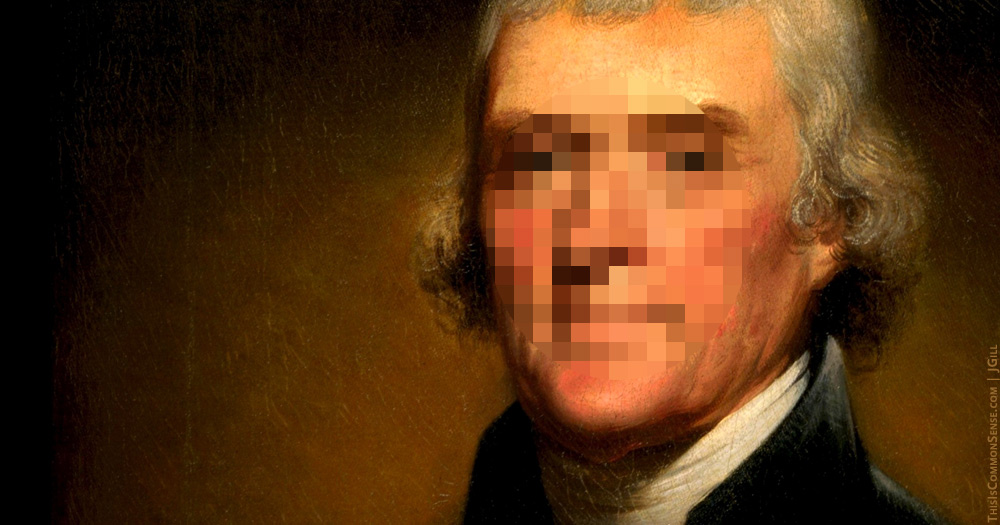“Should they take down the Jefferson Memorial?”
That is what PBS’s Charlie Rose asked Al Sharpton. Now, the “Reverend” is not my go-to source for political insight, but his answer* caught my attention.
“I think that people need to understand that, when people that were enslaved and robbed of even the right to marry and had forced sex with their slave masters, this is personal to us,” replied Rev. Sharpton. “My great-grandfather was a slave in South Carolina . . . Our families were victims of this.”
Asked if this precluded “public monuments” for “everyone associated with slavery,” Sharpton argued: “When you look at the fact that public monuments are supported by public funds, you are asking me to subsidize the insult to my family.”
One can attack the messenger, Sharpton, sure. But what if we instead think of him as our neighbor? I certainly wouldn’t want to insult a neighbor, much less make him pay for the privilege.
Notably, the Reverend embraced privatization, suggesting, “You have private museums.” Privatizing controversial monuments would certainly solve Sharpton’s stated problem.
Of course, the logic behind taking down statues or dismantling the Jefferson Memorial — or merely privatizing them — might also lead to changing the names of cities, counties and states, rivers and mountains. And it’s not just Washington and Jefferson — twelve presidents were slave owners, including Union General U.S. Grant.
Who knows how many are undeservedly memorialized?
Frankly, I’ve never liked the name of my Virginia county: Prince William. A liberty-loving people ought not be stuck with such a monarchial brand.
Let the people decide.
But by vote, not street brawl.
This is Common Sense. I’m Paul Jacob.
* This exchange begins at the 15:22 mark in the interview.


6 replies on “Statues and Limitations”
‘taking down statutes ‘
Statutes? I think you meant statues.
A statute is an enactment, a rule, a law.
Fixed. Probably an artifact of auto-correct. Thanks for pointing it out, Pat.
When the United States was formed slavery was a nearly universal affliction of human society, as it had been from the time of Moses. The Declaration of Independence can rightly be interpreted to a rejection of a slavery to a hereditary sovereign, owner and controller of all. Whereas the War Between the States was, later, in part, driven by the issue of slavery, it as part of its effectr banished the ugly institution from the United States which was in keeping with the principles and philosophy which still provide the only true commonality of the citizens of this country.
Yes, we have in US history (and that of humanity as a whole) much to be ashamed of, and to learn from.
We have improved exponentially as a country and provided the roadmap which provided a standard of living and freedom which is without any equivalent in history.
Those who would negate the history, and seek to revisit and judge those who were so instrumental in this country’s and the world’s progression by judging them with the standards of this day are missing the miracle of the advancements which they, and the philosophy and principles they bequeathed us, instigated.
While I might revisit some of the statues and examine their premise and purpose, I will resist a massive recalibration of history to emphasize the shortfalls and errors of the United States as opposed to its corrections of itself and the advancements it commenced and could continue if its founding and underlying philosophy is acknowledged and followed.
The Founding Fathers were extraordinary persons who faults must be recognized, but whose accomplishments should be emphasized.
Personally, I will not grant Rev. Sharpton any favor as a result to the travesties visited upon his great-grandfather. nor do I expect any accommodation for those visited upon mine. I will judge Rev. Sharpton on his personal accomplishments, and if what he champions advances or retards the progression forward for all.
Rev. Sharpton should be fully aware of and true to the principle that it is only he or she who is without sin that should cast the first stone. Choosing to live as a victim of the past is an excuse to abrogate one’s individual responsibility for what he or she is. It advances neither the individual, the society or humanity.
“Personally, I will not grant Rev. Sharpton any favor as a result to the travesties visited upon his great-grandfather. nor do I expect any accommodation for those visited upon mine. I will judge Rev. Sharpton on his personal accomplishments, and if what he champions advances or retards the progression forward for all.
“Rev. Sharpton should be fully aware of and true to the principle that it is only he or she who is without sin that should cast the first stone. Choosing to live as a victim of the past is an excuse to abrogate one’s individual responsibility for what he or she is. It advances neither the individual, the society or humanity.”
Well said.
So many people have been taught in government schools that the Civil War was about slavery that any other truth has disappeared.
I agree. Think about the gravity of your statement and what it implies must be done.